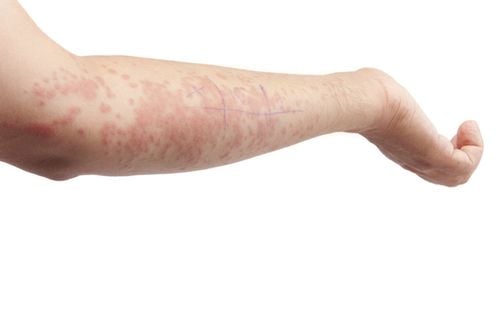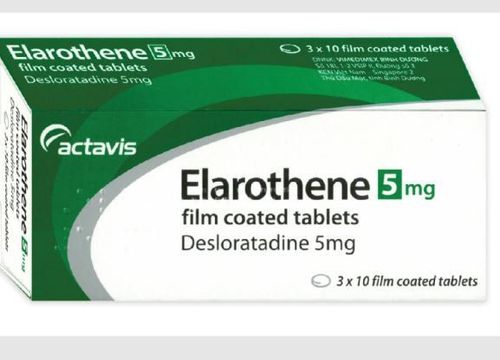This is an automatically translated article.
The article was professionally approved by Master, Doctor Dang Huy Toan - Department of Pediatrics - Neonatology - Vinmec Nha Trang International General HospitalAllergies are related to genetics, if a person is born in a family with parents with allergic diseases, the risk of allergies is very high. If both parents are allergic to the same disease, the child's risk of allergies will be about 50-80%.
1. What is an allergy?
Allergies, also known as anaphylaxis, occur when an allergen causes an adverse reaction to the body's immune system. Allergens when combined with antibodies will cause harm to human health. Gradually, the body will initiate some allergic diseases in children.To date, most allergies have no known cause. However, in terms of the immune system, there are complex activities, but because it has to go through many stages, the immune system makes mistakes, leading to allergies. Most of the factors that cause allergic disease include local, external and genetic factors that cause allergies as follows:
Weather allergy: This is an allergic condition that arises when the weather changes suddenly or the body the patient is exposed to too hot or too cold climates. When allergic to weather, on the skin will form red papules or rashes, raised and edematous. These lesions usually appear on the hands, feet, neck, and face, then spread to a large area. These nodules cause the patient to have a burning, itchy and uncomfortable feeling accompanied by symptoms of sneezing, coughing, headache, sore throat, itchy nose or low fever,... Allergy to drugs: Some medicines contain The substance is not suitable for some people's body. When substances in the allergen enter the body, it will cause a reaction. Allergies for taking drugs can be immediate (developing quite quickly and severely) or reacting slowly (no serious symptoms arise, so they rarely affect other organs). An immediate drug allergy often causes swollen hands and feet, abdominal pain, and nausea. Some cases also have difficulty breathing, heart palpitations, anaphylaxis - the most serious reaction, if not treated promptly, the patient can be life-threatening. Skin allergies: This condition is also known as atopic dermatitis. This phenomenon causes inflammation of the skin, which recurs many times. Symptoms of atopic dermatitis such as severe itching, red spots or dark patches on the skin. There are often small blisters or nodules, the skin also becomes thicker and appears scaly. When scratching a lot, the skin will be thick and rough, swollen. Food allergies: Some foods contain ingredients that cause allergic reactions. Allergic foods are usually seafood such as shrimp, crab, oysters, crabs, etc. When there is a food allergy, the immune system produces IgE antibodies to neutralize the trigger that causes the allergy and causes the allergic reaction. different manifestations. These manifestations may appear within hours or minutes after eating with symptoms of itching in the mouth, headache, difficulty breathing, vomiting with diarrhea, swelling of the face and lips,... Some dangerous cases causes spasms, dizziness, low blood pressure leading to unconsciousness. Allergic urticaria: When allergic urticaria, the patient will appear nodules, edema, with a red ring around. Depending on the cause, the urticaria can float for a few minutes or a few hours, making the patient itchy and uncomfortable. If the patient has chronic urticaria, the disease can recur for many years, causing angioedema and seriously affecting organs in the body such as lungs, digestive system... In addition to the above allergies, There are other types of allergies such as: Allergies to perfumes and cosmetics; allergies to insects, animal dander; sun allergy or cow's milk protein allergy,... However, these allergies are only temporary and disappear in a short time.

Các yếu tố gây bệnh dị ứng gồm cơ địa, tác nhân bên ngoài và di truyền gây dị ứng
2. Are allergies hereditary?
Are allergies hereditary? Then the answer is yes. The disease is often related to a family history. Specifically as follows:If a child is born in a family where one parent has allergic diseases, the risk of children having allergies is very high, about 20-40%. If both parents have allergies or one parent has allergies and a sibling has allergies, the risk of allergies in children ranges from 40-50%. If both parents are allergic to the same disease, the child's risk of allergy will be 50-80%. If a child has both parents with allergies and a sibling with allergies, the child's risk of allergy will be 85%. However, in some cases, if the parents are not allergic, the child is still at risk of developing an allergy. This is why the incidence of allergies is increasing day by day.
3. Prevention of allergies
If allergies are hereditary, it is very difficult to prevent, the main prevention is still to prevent children from eating or being exposed to the causes of allergies for children. As for the primary prevention of allergic diseases, experts always recommend the following:Mothers should breastfeed their babies for at least the first 6 months to limit allergies in children. Because breastfeeding for at least the first 6 months of life can reduce the risk of atopic dermatitis for children under 2 years of age, while reducing wheezing as well as reducing the risk of cow's milk protein allergy. During pregnancy and lactation, mothers do not need to avoid foods that often cause allergies such as eggs, beans, milk, peanuts, etc., but must abstain from foods that cause allergies for themselves. prevent dangers. For infants at risk of allergies who cannot breastfeed in the first 6 months of life, nutritional formula with hydrolyzed protein must be supplemented with the infant's locality.

Các bà mẹ nên nuôi con bằng sữa mẹ trong ít nhất 6 tháng đầu để hạn chế dị ứng ở trẻ em
Please dial HOTLINE for more information or register for an appointment HERE. Download MyVinmec app to make appointments faster and to manage your bookings easily.













